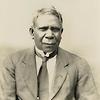He's the wry smiling Aboriginal man wearing a collar folded like a paper aeroplane on the 50 dollar note . A prestigious place for a portrait, so how did David Unaipon become so noteworthy?
Unaipon was born in 1872 on the Point McLeay mission in the town of Raukkan, just 80 km southeast of Adelaide. He was the fourth of nine children of evangelist and father, James Ngunaitponi and Nymbulba, Uniapon's mother. Both his parents were of the Yaraldi, lower Murray region, group. 'Uniapon' is an Anglicisation of Ngunaitponi.
Unaipon showed academic promise as young as 7 years old, when he started attending the mission school. The former secretary of the Aborigines' Friends' Association stated in 1887, "I only wish the majority of white boys were as bright, intelligent, well-instructed and well-mannered, as the little fellow I am now taking charge of".
At 13, he left school to work as a servant in Adelaide for Charles Burney Young, a landowner and successful winemaker. During his employment at Young's 'Swancombe' estate, Unaipon was actively encouraged to pursue his interests in literature, science, philosophy and music.
When he returned to the Point McLeay mission in 1890, Unaipon continued to read widely and learned new skills like playing the organ and bootmaking.
In 1902, Unaipon married Katherine Carter, a Tangani woman from the Coorong who worked as a domestic servant.
Unaipon worked a few roles, as a bookmaker and as a bookkeepers assistant, before he developed a shearing device in 1909. He was focused on creating perpetual motion machines and was named the 'Australian Leonardo da Vinci' for developing the centrifugal motor, a multi-radial wheel and a mechanical propulsion device. He is also said to have contributed to the helicopter, having designed its rotors pre-World War I, based on the principle of the boomerang and of course, his fascination with perpetual motion.
Unaipon was the first published Aboriginal author, after he was commissioned by the University of Adelaide to assemble a book on Indigenous legends and storytelling in the early 1920s. The David Unaipon College of Indigenous Education and Research at the University of Adelaide was subsequently named after him.
He was also the first Aboriginal writer to be published in the English language with a number of his articles in the Sydney Daily Telegraph discussing Aboriginal rights, traditional customs and even his inventions.
Unaipon traveled widely and lectured on his ideas, preached sermons and spoke about Aboriginal legends and customs. He also spoke of the need for 'sympathetic co-operation’ between white and black Australians, and for equal rights.
“David Unaipon first of all, forced Australians to accept Aboriginal intelligence then he forced them to consider the scientific knowledge of the world’s oldest culture. His legacy paves the way for younger Aboriginal people to unearth the Indigenous science Australia has buried beneath a ton of denial" - Bruce Pascoe, Author
“Indigenous science and innovation is embedded into a vast knowledge system that has sustained this earth for more than 80,000 years and David’s work embodies just how Indigenous people think when it comes to innovating and inventing.” - Luke Briscoe, INDIGI LAB Founder and NITV Digital Producer
For all the latest Indigenous news, features and video content at NITV like us on Facebook and Twitter

